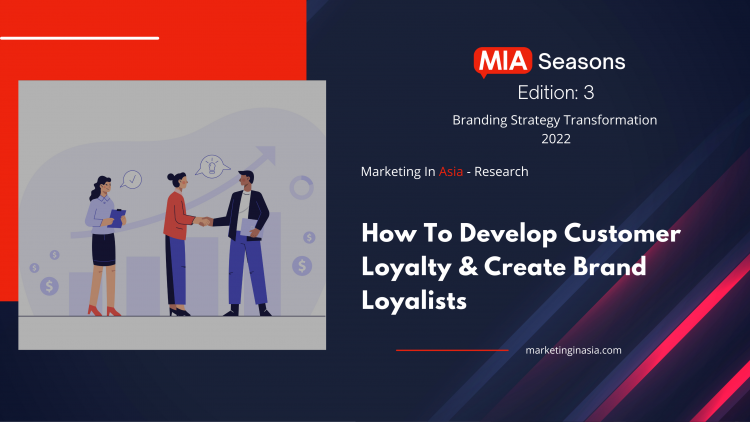Why do companies need to develop customer loyalty?
According to research, it can cost six times more to acquire a new customer than it costs to retain an existing one. This is because once you have them, there is no need to spend time and money trying to find new people. A loyal customer is worth more than what they pay for because they are a reliable source of revenue in the long-term who will come back and buy more products or services from you because you’ve shown that you care about them. The fact that six out of ten consumers surveyed admit they will buy their favourite brand even if this means they need to spend more time or money on it and are more likely to choose it over a product from a rival. This shows how highly people still value loyalty and commitment. (KPMG).
Who are brand loyalists?
In the past, companies were able to build a loyal customer base by providing quality products and services, and those who failed to keep up with the ever-changing needs of their customers would quickly find themselves losing the market share. Today this does not suffice the cause. The millennials and Gen Z are more difficult to please since they are more knowledgeable about the industry, have higher expectations, and are more selective. Simply put, they are much more resourceful. Customer loyalty is no longer about reward points and personalised offers; rather, it has gone way beyond and evolved into something more meaningful – brand advocacy. As the public becomes more sceptical about brands and businesses, brands are finding new ways to earn the trust of their customers, make them feel valued by keeping them happy and this is best done by creating brand loyalists, who serve as an extension to your marketing team and who will gladly sing praises of your product and services purely out of love and loyalty to your brand. Customers advocating for your products or services to others is precious. According to a study, a vast majority (86%) of people would recommend the company they work for to friends and family, provided they are satisfied with their workplace [1].
Also read: Keep Customers And Increase Profits With Customer Retention
Strategies to earn and enhance customer loyalty
In the digitalised economy, social media has given equal power to all to voice their opinion across the globe and the noise that it generates is impossible to let go of. This massive social media court is mounting pressure on companies to please their customers and win their trust constantly. With the eternal memory of the media, any mistake, no matter how small, shall neither be forgiven nor forgotten. With this in mind, companies need to strive relentlessly to build trust amongst its customer, to gain an edge over their competitors incase it ever goes astray. In a recent study, Marketing In Asia (MIA) talks about some measures to spark trust in your customers, enhance customer loyalty and convert them to brand loyalists [2].

Image source: MIA Research Best Brand Building Practices
1. Offering transparency – In the past, consumer behaviour has been dominated by convenience, experience and value and offering transparency in your product/service addresses the experience of the consumer by showcasing the company values. How important is it for a customer to have complete information about a brand before a purchase is answered in an Inc study that states 39% of consumers would start using a brand if it offers full product transparency [3]. MIA data reveals that while more than three quarters (78%) of the respondents wanted to build trust among its customers, only a handful (14%) were willing to offer transparency in their offering.
2. Sharing & embodying your brand values across the organisation – According to Fundera data, 89% of people stick to buying a brand that shares their values [4]. Knowing your brand is essential, but do you put it into practice? Successful companies are known to be driven by their brand, and as a company that strives to maintain specific values, it is crucial to know who you are and what you represent. Your workplace needs to reflect this as well, as it would serve as a source of inspiration for all who enter! If your team cannot embody the values that you are aspiring to be, it might be time to take a hard look at what it is that you are trying to achieve. Out of those who wish to build trust, only 17% embody their company values and represent what they are selling [2].
3. Administering quality control – To build good customer relationships and deliver on their promises, companies need to provide quality products. Customers will only trust a company if it can consistently meet the needs of its customers and provide them with a reliable and high-quality product. If you are a company that has earned your customer’s trust, then introducing any new items is easier as 60% of your customers will be willing to try the new products [5]. Our research found that 85% of startups have made quality control a top priority and have invested more resources in quality control to ensure that the most important aspects of their product are working flawlessly.

Image source: MIA Research Best Brand Building Practices
4. Consistent experience in every interaction – For any brand, customer experience is the key to success, defined as how customers perceive the quality of their interactions with a company and how they feel after those interactions. According to a survey done by Facebook, the top three factors that keep people coming back are product quality, consistency in interactions and experiences, and cost [6]. Today’s consumers expect affordable quality products, a consistent experience with brands, and to be able to shop at their leisure. Our data has shown that less than half (48%) of the respondents consistently deliver a memorable experience over every interaction with their customers and for those who do prioritise this, it was limited to only the first interaction.

Image source: MIA Research Best Brand Building Practices
5. Value for money – One of the most important aspects of any product is the price – not only must it be attractive, but it must also be beneficial for the customer compared to other available products. If a product is expensive and doesn’t perform as well as its cheaper competitors, no customer will ever want to come back. The majority of respondents, 94% in fact, who were surveyed in the study said that they considered the worth of their product or service when pricing it and strived to deliver value for money.

Image source: MIA Research Best Brand Building Practices
What did Everlane do differently?
One of the biggest and most popular clothing companies, Everlane, has been known to be an industry leader in transparency when it comes to their production processes and labour costs. This is because they decided to place this information in a film when consumers were unaware of the ins and outs of the production industry, thereby making a name for themselves in the clothing sector by gaining sustained customer loyalty. The company realised early on that millennial users don’t care about anything but authenticity and transparency and today, it has brand loyalists across the world.
To know more about how to develop customer loyalty and build trust – Download the MIA research report: Best Brand Building Practices
- https://home.kpmg/xx/en/home/insights/2019/11/customer-loyalty-survey.html
- Best Brand Building Practices
- https://www.inc.com/kenny-kline/new-study-reveals-just-how-important-brand-transparency-really-is.html
- https://www.fundera.com/resources/brand-loyalty-statistics
- https://www.invespcro.com/blog/how-branding-influences-purchase-decisions-infographic/
- https://www.lyfemarketing.com/blog/benefits-of-branding/
















